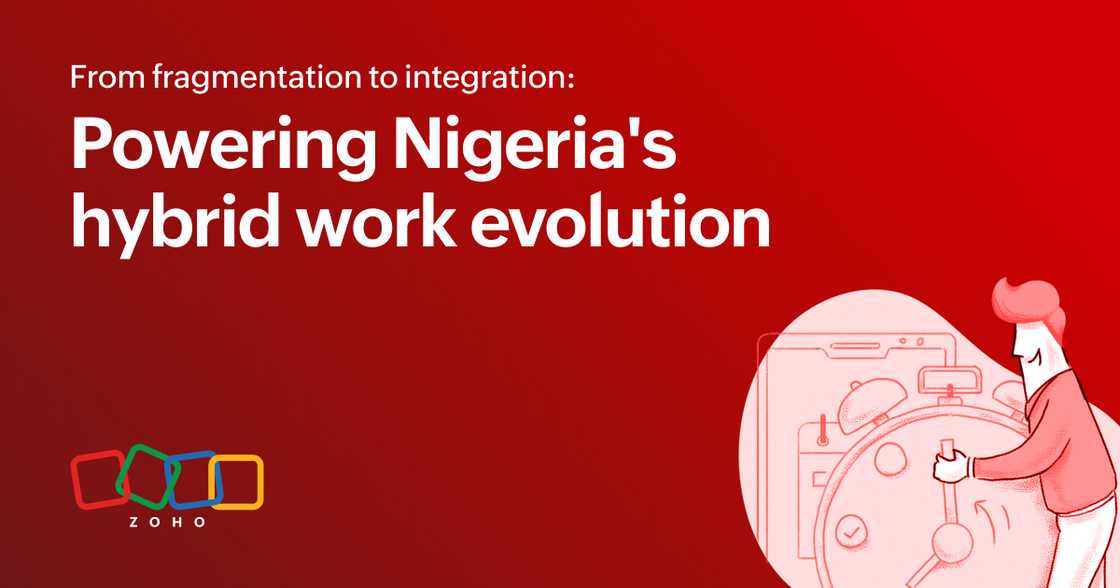From Fragmentation to Integration: Powering Nigeria's Hybrid Work Evolution
As Nigeria navigates a fast-moving economic landscape, a hybrid work revolution is taking shape. Data from Zoho's 2024 report shows that 31% of Nigerian businesses have already adopted a hybrid work model, blending remote and in-office operations, while the global trend is closer to 25%. With the growing trend toward hybridisation, modern organisations' success depends on having adequate digital tools that enable seamless collaboration across diverse physical locations.

Source: UGC
Organisations moving to hybrid operational models face significant challenges, including data silos, communication barriers, and difficulties in monitoring productivity. Employees often feel overwhelmed by having to juggle multiple applications for their daily tasks, which results in digital fatigue. Identifying these issues and working together to create solutions that ease this burden is essential.
These challenges can also potentially lead to substantial business losses, underscoring the critical need for effective and practical solutions. What was once perceived as just a flexible working model has now become mainstream and presents a significant risk to the efficacy of business operations if not addressed effectively.
Nigeria's hybrid work model highlights how the changing work environment worsens existing inequalities. Some employees who shift to remote work have the right technology and infrastructure, while others struggle with limited access to high-speed internet and inadequate devices. This divide raises essential concerns about inclusivity and underscores the urgent need for action.
According to Zoho's 2024 report, 51% of employees utilise between one and five applications daily, 35% use six to 10, and 14% rely on more than 10 applications. In contrast, 81% of C-suite leaders use more than 10 daily applications. These statistics showcase the need for multiple apps for collaboration and execution. Conversely, the more tools you use, the greater the risk of duplication, delays, and missed context. Hence, it always helps if businesses have an integrated software ecosystem that allows for the seamless flow of data and communication across functions.
Another critical challenge is unreliable internet connectivity, which significantly hinders effective hybrid collaboration. It's crucial to reiterate that ensuring consistent and reliable internet access isn't just good-to-have but essential to productive interactions in hybrid work environments.

Source: UGC
A unified digital solution can address these challenges, streamline operations, and enhance efficiency and productivity. Most importantly, it can help restore the vital connection between organisation members. As Bolaji Afolabi from Global Clique Nigeria puts it, "I do not have to juggle from tab to tab; everything is in one place." This highlights how an integrated digital suite can simplify daily work and make it less overwhelming for a business.
In 2024, over 7.7 billion cyberattacks were blocked across websites and APIs, averaging 5.5 million attacks per website. APIs faced 43% more attacks than traditional sites, and 33% of critical vulnerabilities remained unpatched for over 180 days, highlighting serious security risks. Zoho addresses critical challenges such as these through secure coding, strong data encryption, and multi-factor authentication. Tools like Zoho OneAuth, Zoho Vault, and Zoho Directory create a robust security framework that enhances trust in Zoho's digital ecosystem.
Fortunately, organisations are beginning to realise the need to transition from isolated tools to integrated digital ecosystems. This shift is essential to effectively addressing the complexities of hybrid work. Cloud-based integrated tools are excellent solutions for addressing the unique needs of Nigerian businesses that operate in hybrid work environments. By integrating essential functions such as customer relationship management, team communication, project coordination, and workflow automation, businesses are overcoming hybrid challenges.

Source: UGC
To help businesses of all sizes on their journey toward hybridisation, Zoho provides an integrated suite of applications. With over 55 connected tools, Zoho reduces dependence on using multiple apps, supports local pricing in Naira, offers offline functionality, and ensures compliance with local data protection regulations.
The hybrid work model has become essential to the contemporary business landscape. For organizations to thrive in this environment, it's imperative to break down silos and promote collaboration across all systems. By embracing hybrid models, businesses can significantly enhance team performance by adopting integrated solutions.
To discover how Zoho's cloud solutions can optimise your hybrid operations, visit www.zoho.com.
[Sponsored]
Source: Legit.ng


